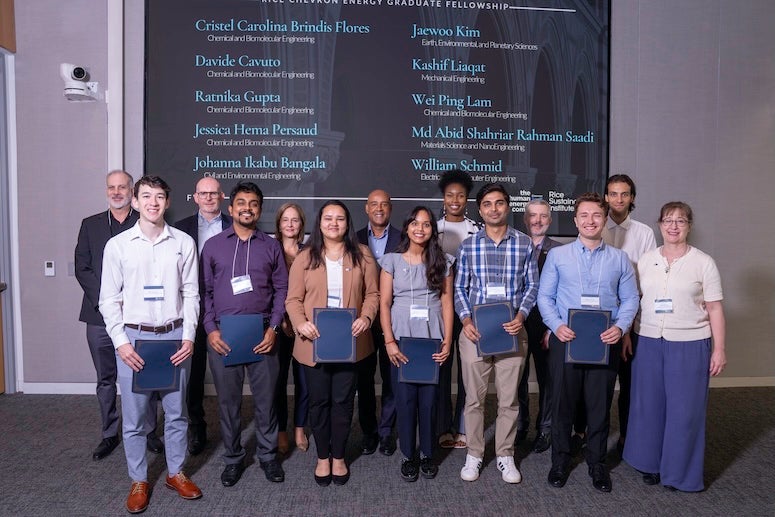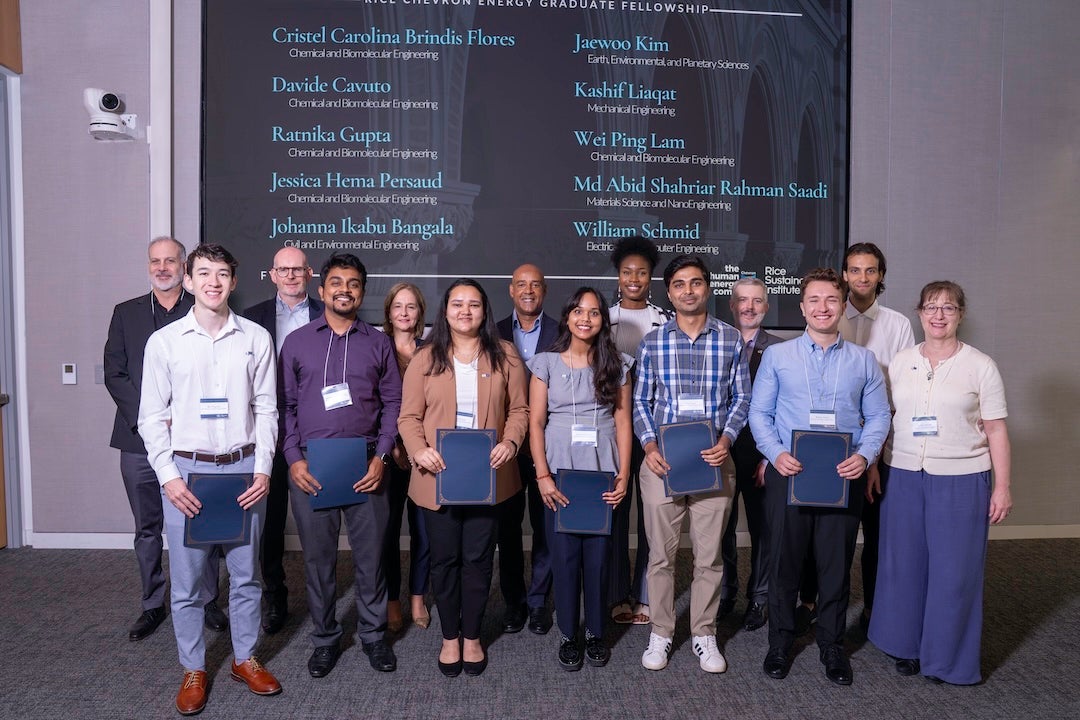
Rice University has named 10 graduate students as recipients of the 2025-26 Chevron Energy Graduate Fellowships, a program created through a partnership between the Rice Sustainability Institute and Chevron. Each fellow receives a $10,000 award to support research advancing scalable energy innovations that reduce emissions, accelerate low-carbon technologies and improve the reliability and efficiency of current and future energy systems.
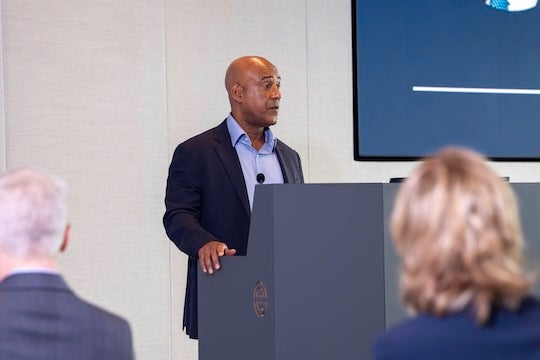
The fellowship program, launched last year, reflects a shared commitment between Rice and Chevron to foster the next generation of energy leaders. At the award reception held in September, Rice President Reginald DesRoches emphasized that the collaboration aligns with the university’s mission to drive transformative research.
“This exciting partnership between the Rice Sustainability Institute and Chevron represents our shared commitment to advancing scalable innovations in energy that lead to emissions reductions across energy value chains,” DesRoches said. “… We are grateful to Chevron for the continued support and vision, which aligns seamlessly with Rice University’s mission to drive transformative research and nurture future leaders. Through our combined efforts, we are not only empowering our students but also contributing to a more sustainable and innovative future.”
Chevron leaders also highlighted the importance of investing in emerging talent.
“Rice University continues to be an exceptional partner in advancing energy innovation,” said Chris Powers, director of exploration commercial and portfolio at Chevron. “The Chevron Energy Fellows program showcases the brilliance and drive of Rice graduate students, whose research in areas like carbon conversion, solar materials and geothermal sensing is already shaping the future of sustainable energy. We’re proud to celebrate their achievements and look forward to the impact they’ll continue to make across the energy landscape.”
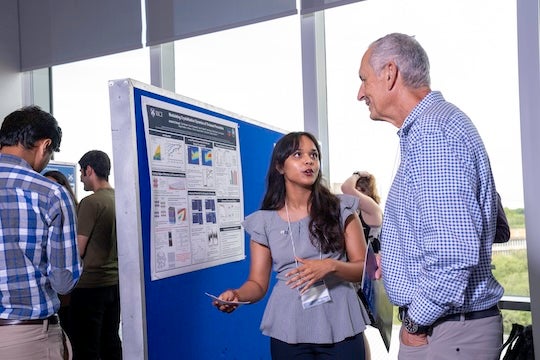
Beyond the financial support, fellows gain access to a network of resources designed to amplify the impact of their research. Chevron and the Rice Sustainability Institute will connect students with industry experts who can provide valuable insight on scaling technologies from the lab to commercial application. Fellows will also be invited to participate in a cross-university virtual symposium in the spring, where they will present their projects, exchange ideas with peers from other institutions and build collaborations across disciplines. These opportunities not only strengthen their research but also prepare them to become leaders capable of driving the energy transition on a global scale.
The 2025-26 cohort represents schools and departments across Rice, from chemical and biomolecular engineering to Earth sciences, civil and environmental engineering, mechanical engineering and materials science. Their projects address a wide range of pressing energy challenges, from novel storage technologies to carbon capture, sustainable fuels and resilient infrastructure.
The 2025-26 Chevron Energy Graduate Fellows include:
- Cristel Carolina Brindis Flores (Adviser: Walter Chapman, Chemical and Biomolecular Engineering)
Molecular Simulations of CO₂ and H₂ for Geostorage - Davide Cavuto (Adviser: Matteo Pasquali, Chemical and Biomolecular Engineering)
Intensification of Floating Catalyst Chemical Vapor Deposition for Carbon Nanotubes Synthesis - Jaewoo Kim (Adviser: Jonathan Ajo-Franklin, Earth, Environmental and Planetary Sciences)
Distributed Acoustic Sensing for In-situ Stress Monitoring in Enhanced Geothermal Systems - Jessica Hema Persaud (Adviser: Aditya D. Mohite, Chemical and Biomolecular Engineering)
Understanding Tin Perovskite Crystallization Dynamics for All-Perovskite Tandems - Johanna Ikabu Bangala (Adviser: Pedro J.J. Alvarez, Civil and Environmental Engineering)
Upcycling Methane-derived Zero-Valent Carbon for Sustainable Agriculture - Kashif Liaqat (Adviser: Laura Schaefer, Mechanical Engineering)
From Waste to Resource: Increased Sustainability Through Hybrid Waste Heat Recovery Systems for Data Centers and Industry - Md Abid Shahriar Rahman Saadi (Adviser: Pulickel M. Ajayan, Materials Science and NanoEngineering)
Advancing Sustainable Structural, Energy and Food Systems through Engineering of Biopolymers - Ratnika Gupta (Adviser: Sibani Lisa Biswal, Chemical and Biomolecular Engineering)
Micro-Silicon/Carbon Nanotube Composite Anodes with Metal-free Current Collector for High Performance Li-Ion Batteries - Wei Ping Lam (Adviser: Haotian Wang, Chemical and Biomolecular Engineering)
Electrifying Chemical Manufacturing: High-Pressure Electrochemical CO₂ Capture and Conversion - William Schmid (Adviser: Alessandro Alabastri, Electrical and Computer Engineering)
Light-Driven Thermal Desalination Using Transient Solar Illumination
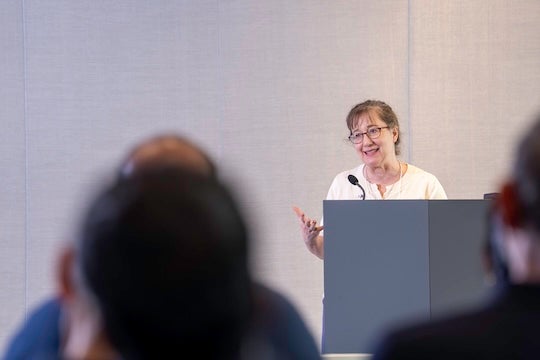
Carrie Masiello, director of the Rice Sustainability Institute, praised the fellows’ range of projects.
“Through this fellowship program, we can support outstanding graduate students from across the university who are conducting cutting edge research across a variety of fields,” Masiello said. “… This year, our 2026 Chevron Fellows are working on research that reflects the diversity of the sustainability research at Rice … and these scholarly endeavors exemplify the breadth and depth of research enabled by Chevron’s generous support.”
With its second cohort now underway, the program is strengthening a pipeline of innovation that will support society’s transition to affordable, reliable and sustainable energy.

